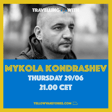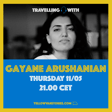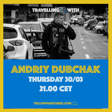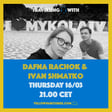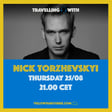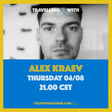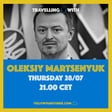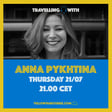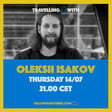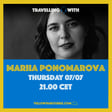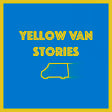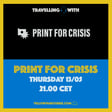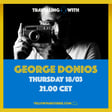Become a Creator today!Start creating today - Share your story with the world!
Start for free
00:00:00
00:00:01

Anastasiia Sanzharovska "Day By Day"
Anastasiia Sanzharovska is a producer, director, and video editor from Ukraine. She originally studied system analysis and maths but turned to her real passion film soon after finishing her studies. She has been working as a producer, director, 1st AD, and video editor ever since. In February 2022, Anastasiia was in Egypt for a 3-week holiday but got stuck there due to Russia's invasion of Ukraine. She has been living there ever since.
We'll talk about her early beginnings in filmmaking, why she chose film over maths, the Ukrainian TV scene, and her life in Egypt. And, as always, a lot more.
Welcome to the Yellow Van, Anastasiia! Thanks for travelling with us.
SHOW NOTES
Links to a selection of Anastassia's works
What Is Wrong With Me (Short Film) - Direction
ZFeelZ Shame (Music Video) - 1st Assistant Director
Тизер ДВДС 2 (Short Movie) - 1st Assistant Director
Anastasiia's Social Media Channels
Facebook
Instagram
LinkedIn
Sinai Media Club in Sharm El-Sheikh
Initiatives To Support
Prytula Foundation - Support for the Ukrainian Army
Come Back Alive - Support for the Ukrainian Army
National Bank of Ukraine - Dedicated Account for the Humanitarian Assistance of Ukrainian Citizens
MUSIC
Love In The Face Of Fear, Jim Kroft
Yellow Van Stories is a Mind the Bump Production.
Transcript
Life in Limbo: Ukrainian Displacement
00:00:04
Speaker
Many people whom I know who turned out to be abroad or just away from their home in other cities of Ukraine, some were of the west. No one has a feeling how deep you should root, how long you will spend there. And yeah, this feeling of not knowing your future of undefinity.
00:00:24
Speaker
It's something that stresses a lot, but I would say that this approach, which I described like day by day, week by week, it is something that helps you to stick with the moment and not to worry about something in a long-term perspective.
Introduction to Yellow Van Stories Podcast
00:00:43
Speaker
Hello and welcome to a new episode of the Yellow Van Stories. I'm your host and driver Bastia. Thank you for making the time to come on board with us today. We've been waiting just for you and kept your usual seat by the window side. After Russia's invasion of Ukraine, the topic of the second season became very clear to us. We decided to invite Ukrainians into the van to share their stories with us and to learn more about Ukraine's cultural identity.
00:01:10
Speaker
because too often it has been appropriated by a chauvinistic Russian narrative. And the same narrative now serves as a pretense to the war. Supporting Ukraine, in our opinion, therefore has a very strong cultural dimension as well. Fonzi is in Farski already and we are good to go. So buckle up and sit back, because today we're going to a rather unexpected place. To Sharm El Sheikh in Egypt.
Guest Spotlight: Anastasiya Sancharovska
00:01:37
Speaker
To pick up Anastasi.
00:01:44
Speaker
Hello and welcome to a new episode of the Yellow Band Stories. Here with us today is Anna Stasya Sancarowska, a producer, director, and video editor from Kyiv in Ukraine. Very happy to have you with us today, Anna Stasya. Thank you, West End. Happy to be here.
00:01:59
Speaker
Very nice that you found the time. This has been some time in the making. So we have finally lined our schedules. That's fantastic. And I'm very, very happy that you found the time today. I will just give a quick introduction to the listeners of what you do, a little bit of an outlook on our conversation today, and then we'll dive right in. How does that sound? Yes, it's like ready to hit.
00:02:23
Speaker
Anastasiya Sancharovska is a producer, director and video editor from Kyiv in Ukraine. She originally studied system analysis and maths but turned to her real passion film soon after finishing her studies. She has been working as a producer, director, first AD and video editor ever since.
00:02:42
Speaker
In February 2022, Anastasia was in Egypt for a three-week holiday, but got stuck there due to Russia's invasion of Ukraine. She has been living there ever since.
Cultural Adjustments in Egypt
00:02:54
Speaker
We'll talk about her early beginnings in filmmaking, why she chose film over maths, the Ukrainian TV scene, and her life in Egypt. And, as always, a lot more. Welcome to the yellow van, Anastasia. So where are you at the moment, actually? I'm in Egypt, in Sharm al-Shaykh.
00:03:12
Speaker
It's a small town in southern Sinai. And how is life in Egypt to just start with a very broad question right away? Actually, I would say it's kind of the opposite to the life in Europe or in Ukraine, because they have another mentality, another approach, another what was the most challenging for me personally. They have another attitude at the time.
00:03:42
Speaker
For example, I know that Germans are very punctual and the Egyptians are just on the opposite side because they can be late for two hours, four hours.
00:03:53
Speaker
I understand. I mean, I wouldn't say that I am necessarily a picture book German. I also am known to be late sometimes. I do very much differ. The funny thing is that I differentiate very much between my private time and professional time. When I'm somewhere professionally, I'm always there ahead of time generally. But in my private life, I sometimes give a little more slack. So I think I have both worlds.
00:04:19
Speaker
Also, I know this can also be a cultural thing, I agree. So is that something that you've gotten used to, or is it something that still annoys you quite a bit? I would say that I'm starting to accept this funny fact and this part of their personalities. But sometimes, yes, I still... I would say I'm okay with it in personal life, but if I know that we have agreement with someone,
00:04:46
Speaker
about shooting and my boss is running late so yeah if he is very late it is annoying because i still feel responsible for our agreements or something like that although it's not my word it's his word
00:05:01
Speaker
Still, I'm not very comfortable with being late, especially knowing that sometimes you will need to work with foreigners or with people outside of the country and they have more classical attitude to time and to schedule into timetable. I like how you put a classical attitude towards time. I like that.
00:05:23
Speaker
That's a very classical attitude towards time. Absolutely. Well, yes, but I know, you know, I also, I grew up in Africa, in South Africa, to be exact, actually. And, and I've been in some places, and yeah, and time is always, it's a very cultural thing, actually, that's very true, the perception of it and how you...
00:05:39
Speaker
how you deal with it, absolutely.
From System Analyst to Filmmaker
00:05:42
Speaker
So before we get deeper into that, I would very much like to actually start with you first, your journey into filmmaking. Because like I said in the beginning already, you studied system analysis and maths, and it's quite a long stretch from system analysis and maths to filmmaking. How did that happen? Would you care to just describe that journey a little bit for us?
00:06:04
Speaker
Yes, sure. Basically, I finished my bachelor degree, which was math. And I wasn't exactly sure what to do further in my life. I already had a part time job as an economist in bank. So I was combining it with my studies. But I kind of didn't feel that it is something I'm
00:06:26
Speaker
looking forward to do my whole life. And I already persuaded that IT and software engineering is also not my cup of tea. And pure mass is not something you can really use to build career or earn money unless you want to make it like science or unless you want to become a teacher or a lecturer. Also not something I was looking forward to.
00:06:55
Speaker
So basically I decided to continue my studies and to take some more time to decide what to do in my future. But in the meantime, I accidentally found out that there is a film school in Kiev and that they have an open door J and I went there.
00:07:16
Speaker
And I understand that I want to continue in this direction, but I wasn't ready to start my year program immediately or to do something big to take more responsibilities. But they started organizing some events, like maybe once a week, some lectures for everyone. And I started attending, and that was something I was looking forward really
00:07:40
Speaker
because I had my studies, I had my job at bank, sometimes I was doing some sports, but basically all my passion and all my concentration was going to these lectures, these meetups, these master classes or whatever is organized. Actually, my initial plan was to finish my magistery, my master program with system analysis, which takes two years and then go to film school.
00:08:06
Speaker
But eventually I couldn't wait longer than one year. So I enrolled in the film school and I was finishing my master's degree at the same year. What was it about film that was it like, yeah, this is definitely something other than maths or system analysis, something that I can see myself do long-term. Was there like a trigger or something? Like a film, I don't know, like something that triggered it?
00:08:33
Speaker
I don't know what exactly triggered because there was a bunch of facts. Basically, when I am thinking about even my last years of school, I was thinking about doing something in this direction, but I wasn't very confident. I was thinking that it's too early to start when you're just 17. You have no experience in life and you haven't seen much. It was like step by step.
00:09:02
Speaker
I was getting to know better to this profession, to this industry, to some of the details I didn't even think about, that it's not only being creative and else it's also about business, it's also about you need to stick with demands of producers and with demands of the industry, with something that you will be able to sell afterwards.
00:09:28
Speaker
And sometimes it's exhausting. It takes much more hours than a normal office day. And it doesn't have this like boring, but easy schedule. I would say that rewards. I start like during this master classes, I feel some short exercises and understood that I like, I really feel good during the process. It inspires. Although even sometimes first, first times I was really stressed.
00:09:56
Speaker
and sometimes awkward and didn't know what to do. But still, a couple of hours later, I was starting feeling myself more comfortable and more confident. And they started enjoying. And even at the end of the day, when you're completely exhausted and you have no power, afterwards, when you start editing or when you recollect what you've done, when you realize that this is like a small child of yours,
00:10:22
Speaker
It's just something inspiring about it. I'm not sure if I did actually answer your question because maybe it's not something I can explain rationally, but it's more about some inner feelings, some emotions, and you just feel that it is right for you. That is something you want to do.
00:10:42
Speaker
No, I think you absolutely answered the question. I mean, you answered with passion. I mean, obviously this is something that goes a long way for something that you will do for the rest of your life, I believe. So I think there's probably a lot in that. What was your first paid job that you got after you realized this is something I want to get into? I want to stick with this. My first paid job? Actually, I would say
00:11:13
Speaker
there were some very small jobs. Once I edited a short video for some center of kids development, just like I edited a small video for a kids concert. I think that was the very first job. But it was even before this full course in film school. At first I took a short course on video editing and this is something I found after that.
00:11:41
Speaker
Yeah, and also another small small page job was a clever girl, like two days of being a clever girl on the documentary project. It was almost at the same time when I was finishing my diploma movie. But the like long term job, the the normal job for which it got was assisting the producer assistant.
00:12:08
Speaker
Uh, and yes, it was something I was doing for about a year and it was maybe months later or almost immediately I finished my film school. So yeah, I would say this was my first normal paid job.
Networking and Early Career in Film
00:12:21
Speaker
And, um, you also like when you did film school, you obviously met a lot of people, right? Is that, is that also one of the things that are valuable about actually going to a film school that you connect, you build a network, you have people that share the same passion. How was that for you?
00:12:36
Speaker
Definitely, yes, you meet a lot of people. But one detail, both me and my friends, everyone was thinking, okay, we'll go to film school, I will meet famous directors, famous producers, and Dallas and Dallas and Dallas, but maybe okay, you have lectures, you have some people who come to share information with you or who guide you all the time. But mostly you meet with the same beginners as you are.
00:13:02
Speaker
And it's not a bad thing, but just like, I don't know why all of us have these expectations, because it's not exactly what happens. But we built a great connections with these guys. And even, you know, we met this person, and after a year or two, you're meeting already, like, you meet them on bigger projects, you meet them on the shooting, like, on the shooting set, and
00:13:31
Speaker
Actually, if you're really passionate about it, you will continue moving in this direction and you will deal with the same people, but they will become professionals after quite a short period of time. So it's not that you should think, oh, they don't know anything. You also don't know anything but give it like two years.
00:13:50
Speaker
And you will reach another level.
Ukrainian TV Production: Challenges and Insights
00:13:52
Speaker
To be honest with you, I sometimes feel like I still don't know anything as well. And I've been doing this for 15 years, a lot of it. I feel there's still so much to learn and so many new things that you want to bring to fruition or ideas that you have that require new
00:14:11
Speaker
new talents, new everything. I sometimes feel like movies and filmmaking and also photography, they're always new beginnings. The more certain you are, of course, you can build up on some experience you've gathered over the years, but it's also that you shouldn't feel too safe about what you know, but to also realize with every project, there's a lot more to discover. At least that's how it is for me. How is that for you?
00:14:39
Speaker
I would actually agree because every new project was bringing some new point of view for me or new tasks or a new format or whatever. And of course, it's normal to feel that you don't know anything. I don't think it is possible to learn anything. Because it's creative, it's very wide broad, it's combination of your knowledge and your talent. And I just wouldn't say that you need to
00:15:09
Speaker
stick with something that, okay, I can do this, this, this, and it's enough. You will always find a new ways to develop yourself to maybe just switch from one profession in filmmaking to another or to combine two professions to, because for example,
00:15:27
Speaker
My passion is directing, but I understand that to be a really good director, you need to know quite a lot about screenwriting, quite a lot about acting and working with actors, and quite a lot about how camera works. So it's basically director of photography or cameraman job. And there is even a point of view that most famous directors are stronger in one of these fields, in one of these three fields than in other.
00:15:57
Speaker
So basically, yes, to become a good director, you need to combine all the other professions around it and to feel professional enough to make your movie of a really good quality. Yes, that's a very valid point. As the director, your main focus is the story, obviously, and to bring it all together. And then everybody else has a special focus on their task, which is why I think also what you said earlier,
00:16:27
Speaker
What I read in what you said is the many layers in filmmaking is also something that you love about filmmaking. So this is a part of it. And I think a director brings all the layers kind of together, even though I'm a documentary filmmaker. And I'm not pretending that documentary filmmaker is the same as a feature filmmaker because it's a different process, even though obviously some of the technology is the same and stuff. But even that is not always the case. So there's definitely a difference there.
00:16:59
Speaker
But you also said, or I know about you, that you worked in the Ukrainian TV scene for some time. What series were you a part of?
00:17:12
Speaker
It was the trace. It's a detective TV series about a group of, let's say, policemen, but not exactly policemen, special forces who investigate crimes, who catch the criminals, and who make some experiments with evidences and all of that. So yeah, I think it's similar to this detective stories, which I'm pretty sure every country has on TV.
00:17:40
Speaker
Yeah, for me, it was pretty much new and challenging because it was like the biggest project I've ever participated in. It was about 40 people on the set every time and I was first AD, first assistant director and my tasks included managing these people and
00:18:04
Speaker
taking care of timetable, of everything to happen in time, of not being late, of checking if everyone is ready for the next scene, and this sort of stuff. Yeah, first AD is a very demanding job, right? For everyone who's not aware of first assistant director, it's a very demanding job.
00:18:25
Speaker
Always available actually to everyone, right? Like whenever something comes up, you are one of the first in lines to make sure that it all works out. So it's a very, it's a very demanding job. How long did you do that for? Not very long actually, I would say months and a half or something like that.
00:18:43
Speaker
But it's actually quite exhausting because normally on this kind of series, no one ever has enough money to give enough of shooting days. And that's why people are always in a rush. And they're trying to do, for example, in our case, normally it should be eight shooting days per two series.
00:19:07
Speaker
Actually, two series production was always combined into one, we call it pool. One pool includes preparing to shoot and shooting of two episodes. Normally, there should be eight shooting days, but we had seven. From the very beginning, everyone understood that we need to be faster, we need to cut on some preparation, we need to
00:19:37
Speaker
combine some stuff together and all of that. So yeah, it was pretty much challenging. Okay. That brings me actually to another question I would very much like to ask you if you could describe the Ukrainian TV scene a little bit. I mean, I know this is a very broad question. It definitely varies, you know, also depending what the series is and various other variables, I suppose.
00:20:02
Speaker
But what is it like from financing also? Is there public money that goes into TV series, for instance? Is it all private money that goes in there, like private channels? How does it work? Can you give us a bit of a description, like an assessment of it? Yes, I understand the question. Actually, it depends. It could be worse. From the one hand, we have some institutions.
00:20:31
Speaker
governmental institutions, which give finances for film production, or sometimes also TV series production. There are open pitchings. So basically, it's your chance to prepare also documentation of your project, like the screenplay and the budgeting, the crew and all of that, and you apply for for financing.
00:21:00
Speaker
You have a chance to protect your project, to tell about it, to present it. And after that, you have a chance to actually get this money. From another hand, there are many TV channels, maybe around five or eight big enough and interested enough in producing their own TV series.
00:21:21
Speaker
And basically, what they do, they produce their own products. So they hire the screenwriters. Basically, I would even say they hire the productions. And production finds a screenwriters, the directors and creates the crew who will shoot the TV series on demand of the TV channel. So it could be worth
00:21:45
Speaker
private money and governmental money. All right. And how would you say, do you have a rich TV scene for series and such? Do you have a wide variety? Is it quite small, for instance, like with very limited series? How do you compare it also to other TV landscapes?
Impact of War on Ukrainian Entertainment Industry
00:22:08
Speaker
If you're familiar with any, I don't know, like Germany has obviously
00:22:11
Speaker
a large tv scene because it is a big and large country and a wealthy country right so so how does it how does it compare to that like um not not necessarily just to the german tv scene i know that's very specific but in general if you have any any references uh well of course our tv series production is not that big as american for example which we all know which everybody knows exactly yes yes i mean basically uh
00:22:41
Speaker
I will give you a little bit of historical perspective. Before 2014, Ukrainian TV market and movie market was generally making this kind of products for Russian market, mostly, unfortunately. In 2014, war started, Russia entered Crimea, Donbass, and we also had a revolution. So basically, this was the year when
00:23:09
Speaker
the separation in many industries began and also including film industry. So from that moment on, we started creating our own movies and also our own TV series. First, of course, when something is just starting, it's of not very good quality of not very high level. And mostly we had quite stereotypical TV series.
00:23:33
Speaker
It actually depended a lot on the channel. Most channels had romance, you know, melodrama about a woman who is suffering because of her husband or because she's single and how she's overcoming all of this. There were some men's channels who filmed action, who filmed fighting, who filmed criminals, de-activity series and all of that.
00:24:04
Speaker
I would say recently, maybe during the last three years around, channels started experimenting. They started shooting some teens TV series or detective, but not stereotypical when you have a new crime each episode and you have the team, which works on these crimes from episode to episode.
00:24:34
Speaker
Like, they started changing formats. And sometimes, sometimes they even got better finance, uh, and so they could be more cinematographic, more inventive in the plot. So.
00:24:52
Speaker
Basically, it's like what I see from TV industries, for example, not only from film industries, but in Ukraine and for example, in Egypt, there is always a stage when you do a lot of bad quality projects, but you just need to make them a lot and for everyone to get experience, director, screenwriters, cinematographers. So at first you try, at first you make mistakes, you study from these mistakes,
00:25:21
Speaker
And then afterwards from 100 bad projects, there will be five goods from 100 projects. There will be 10 goods. And so basically that's how it built. And I would say we're still on this in the middle of this process. Unfortunately, unfortunately, because of war, it will not be as fast as it could have been.
00:25:42
Speaker
Because as I told just two or three years before, it started becoming good quality and we started having these projects which we could present. And also, Ukrainian movies were presented on Berlinale, on Venice Film Festival.
00:25:59
Speaker
Yeah, I'm sure that is taking, I mean, I'm stating the obvious, but with the war, I'm sure that this is, first of all, I mean, even to say that as a major setback, it's a major setback for everything. But like you just said, of course, as well, it's not just the money, it's not just the infrastructure, it's also that you have a running history.
00:26:22
Speaker
of moviemaking to make the mistakes and have the teams in place to create better and better content, right? This is how I understood what you said. So this is very, very important to have a line of progression in a way. And now there has been this cut. Do you know at the moment how it is in Ukraine, like film and TV production? How much has it suffered? How much is there still going on at this moment?
00:26:50
Speaker
Actually, I see both bad and good news, because for example, some of the people I know, my cameraman, he said he didn't have much projects for the previous year, but he's hoping that with this spring, with this season, maybe he will have more. I also know a girl who is head of our department, and actually she was working on commercials, on short movies, on music videos,
00:27:19
Speaker
But now I see that she mostly works on some YouTube projects. So basically it's not the level of the projects she used to have before war. But at the same time I see that some TV series which were paused during the first year of war, at first people were waiting for what will happen next.
00:27:42
Speaker
Should they continue or should they wait and it will come back to normal? But I say that they started, they resumed producing this TV series with new limitation, of course, because we still have electricity shortcuts. So now if you're going to shoot, you always need to have a generator.
00:28:01
Speaker
not to be cut out of electricity, just in case and you can't go on the top floors because you need to use generator from the window just in case or you can't be stuck here like not to be stuck in the elevator. And of course, we also have like some restrictions. During nighttime, no one should be at the streets. I don't remember for what hour till what was approximately from 11 at night, yes to five or six in the morning
00:28:30
Speaker
So always also if you're planning a night shift, you should be aware of this and you can't, you need to adjust. And sometimes you have these alarms, air sirens, when everyone should go to shelter and sometimes it takes half an hour, sometimes it takes two hours and like basically
00:28:50
Speaker
Yes, you will be towards late during your shift if you spend over since the shelter, but like, what can you do? It's not something you can predict or not something you can schedule, unfortunately.
00:29:01
Speaker
Yes. And obviously, just to point out, not that it's really needed, but this obviously goes for every profession, everything that is going on in Ukraine. Now, we just have a focus here on the film and TV industry, right? Because that's what you happen to know that very well, and that's where you are coming from. But this is the same for every profession, for every job, everything that needs to be done in Ukraine right now.
Adapting to Life in Egypt During Conflict
00:29:25
Speaker
It cannot just happen. There will always be these interruptions. There will be power cutouts. So whatever
00:29:30
Speaker
whatever is happening to move Ukraine forward is just constantly stalled and delayed and that in itself must also be incredibly painful to watch and experience every single day.
00:29:47
Speaker
I would like to go with you to how you ended up in Egypt, like to that story why you are in Shammel Sheikh now and how that all came about. So can we maybe start together at the point where you decided to take a vacation in Shammel Sheikh?
00:30:09
Speaker
landed there and your vacation was looking forward to vacation after, you know, I'm sure you had been working a lot. And what happened then? I arrived for three weeks with a suitcase. The only things I have
00:30:28
Speaker
basically, I don't know, it's, yeah, I'm slightly distracted. But for me, it's just so funny, because at home, I always had like, you know, a lot of stuff and like, equipments, like computer, like a lot of clothes and all of that. And I never saw that I can leave just with one suitcase of things. But now I do. And it seems, you know, not that bad. It seems good. Like you don't need to take care of a lot of stuff. And yeah, but coming back to
00:30:58
Speaker
My vacation, yes, I arrived to Egypt on February 9 in 2022. So basically, it's two weeks before the war started. When was your departure scheduled? Second of March. And actually, I was thinking that I will come back and I was already like, negotiating about my name's job. It was in a film distribution company. It was also like a new field for me.
00:31:26
Speaker
But then the war started and during the first three or four days, I was just paralyzed. I didn't know what to do. I was basically, I was sleeping, crying, reading the news, and that was the only things I could do during the first three or four days. Then when the first shock left me, I started thinking like what to do next? What to do for?
00:31:57
Speaker
what to look forward. Because at first, everyone was thinking, okay, maybe it will take like, a couple of weeks or a month. So let's see what happens next. Maybe everything will be solved somehow. And I don't know, I heard that there is there are three reactions to stress. Like, stay, hit or run. And I think my reaction was stay. I just
00:32:27
Speaker
I said, okay, I already spent here some time I slightly got used to this lifestyle. And it was February and beginning of March. And so it was still pretty cold in Europe. And they didn't have like much warm clothes with me. I came here in sneakers and leather jacket. So I decided that okay, I will just stay for some time here. I will try to figure out what to do. So I like I rented an apartment for another month.
00:32:57
Speaker
And a couple of weeks later, I was talking also with my parents and I was reading a lot of forecasts, let's say that. And everyone was now was then saying that maybe too much finish fast. So it's something that we will leave with for a long time. And I was
00:33:21
Speaker
thinking, okay, what to do next? Of course, basically. Can I just, just very quickly, because this is interesting to me, because in the beginning, you know, everybody here, everybody here, I mean, what I'm saying, but a lot of people outside of Ukraine, a lot of voices said, this war will be over soon. But in the sense that Russia will run over Ukraine, occupy it and the war will be done.
00:33:45
Speaker
Right? Everybody was predicting Ukraine will go under and Russia will have its way with with it, basically. Now, luckily, that did not happen. But at the time, just after it happened, how were those conversations that you had with your parents? What what did you think? Did you also think that, you know, Russia is going to occupy Ukraine and then we will see how did you talk about it?
00:34:06
Speaker
When I'm saying that everything will finish soon, it's not what I meant that Russia will occupy Ukraine. I mean that maybe they will negotiate on something and they will make a truce. Also, I wouldn't say that I was able to think rationally back then because it was just like, you know, I was worried about my mom who was constantly like she was saying she's okay, but
00:34:31
Speaker
At first, first days, first, maybe a week is the most complicated because it's, it's a shock. And it's not something you used to, because now, okay, air alarm, maybe I should go, maybe I shouldn't go. It's okay. But then you're just stressed. You're not, it's not something you expect that you have no experience what to do in this situation. Should you hide in the like underground parking? Should you hide after two walls?
00:34:57
Speaker
what to do if shops don't work, what to do if all the products in the shops are finished. Like, and also, my dad volunteered to go to the army and I was worried about him because like, actually, he's already 56, already 57, 56. And so, like, you have a lot of stress to proceed here. And I
00:35:24
Speaker
I wouldn't say that I was able to think rationally what will happen next. Okay, I could read, I could read, I could listen to what other people say, but I wouldn't say I made any conclusions myself. Because even before everything started, many people were thinking that it will. Many people were saying that Russia will invade. Basically, in January, I think, yes. In January, I was this, like,
00:35:54
Speaker
common stress that Russia is collecting troops near our borders. But then in February, they started moving these troops away, and everyone kind of kind of pressed out. And I even remember that I was sitting with my friends and one of the guy who is a journalist, he was saying, okay, like before that it was like 5050 that it might happen. Now it's like 3070 that like it will not happen. And then it happened.
00:36:24
Speaker
And I don't know, I wasn't able to think I was just able to, you know, just in short term perspective, because you don't see what will happen after like two years or after half a year even. And they would say that I still have this I, I can't plan for very long future. And
00:36:48
Speaker
I don't know if it is fully okay, but I decided that I will stick with this living here and now perspective because it's something I feel confident now. You can't eat the whole chicken at the same time, but you can eat it piece by piece, bite by bite. This is my strategy for now.
00:37:08
Speaker
I think that's not that it needs any of my affirmation, but I think the chicken is a very good saying. I will definitely take that up in my repertoire and I think that's absolutely right. It's interesting for me, I ask the question because
00:37:24
Speaker
I also understand I have the very privileged view of the non-concerned, right? And I believe that always makes a big difference in how you approach something. So what I mean by that, I am not part of this war in a way. I feel I am on an emotional level.
00:37:39
Speaker
and by thinking that Ukraine needs to have our unwavering support and that I try to keep myself informed. But I'm not concerned. This war is not in my backyard, right? And because it's not, I obviously have a different view and perspective on everything. And it's interesting that you would say that because while this was happening, all the
00:38:01
Speaker
privileged, non-concerned people were talking about in the media about how long Ukraine would last and how long it would take for Russia to take over Ukraine entirely and Kiev and all of that. A few weeks, most experts said. And then when I asked you, you're like, that did not really concern me so much. It was more about my immediate circumstances.
00:38:23
Speaker
This is what was more important to me. So this is, I think, very interesting to hear that there is this paradigm shift and very often the way you see things has obviously to do with your direct consequences of what it is. And the view of the privileged non-concerned, I think, is something that we should also be more concerned of and rather ask questions to people that are directly concerned and have them give their perspective. It's much more important.
00:38:52
Speaker
So then you were in Shamashake, and are you still, what you describe now, are you still taking it day by day? Because you also have found work in an agency now, in Shamashake. I think it's a commercial agency, right? An ad agency? Yes, yes. My company is called Sainay Media Club, and mostly we do some commercials for hotels, restaurants,
00:39:21
Speaker
Sometimes we also shoot events like climate conference, which took place in November, or also some smaller events for, I don't know, for schools or for some artists who perform their concerts in hotels. Sometimes we also deal with small businesses like car rent or whatever, and sometimes we shoot weddings. So basically, you know, there is,
00:39:45
Speaker
I think in Europe, as well as in Ukraine, you have more kind of specialization. So if you do commercials and music videos, you don't do TV series and movies. And if you do events, you don't do, I don't know, commercials and TV series. Here it's not the street because Sharmashek is actually very small. Sometimes for me, who lives my whole life in Kiev, it even feels like, you know, like a village.
00:40:12
Speaker
It's not a village actually, it's a town by the sea for tourists, but still there is not much filmmakers here. I actually think we're one of very, very few. So that's why we basically do different kinds of projects, both big for hotels and small for some private people. And also we have a photography office apart from our main video office. And we can do photography for tourists or for boats or whatever.
00:40:43
Speaker
So yeah, this is like a brief description of what I'm doing now. And actually, yeah, they also, I don't know if I mentioned today or not, basically before, before the invasion of Russia, I was in film industry, I was mostly managing or directing and, but I didn't work with the camera with my own hands. So I was most on like, I don't know, on the,
00:41:11
Speaker
either on creative part or organizing part. And now I'm also on the manual part because I learned how to work with camera, with stabilizers. And now I'm also a videographer. So yeah. I'm sorry, started with, yes, with my planning day by day. So yeah, I would say now I'm on the stage of month by month, maybe something like that.
00:41:39
Speaker
But I think, okay, for example, currently I know that actually during New Year, I went to Dubai from this, like this agency sent me to Dubai to a film and New Year party. And now we're also thinking maybe we will move to Dubai or maybe part of the agency will move to Dubai. So basically now I know that maybe after three months or six months, I will be in Dubai. Maybe I will not. I'm not sure about this. So I can plan like for this perspective,
00:42:09
Speaker
But I still don't know what I will do after the war, because I don't know when the war will finish. And actually, I miss the level of the projects I had before, because I was shooting short movies with my friends, and they had the script of my own short movie, and I was working on TV series. And of course, these projects are bigger and more creative than what I'm doing now, because of course, you can compare films and commercials.
00:42:40
Speaker
In films, you have actors, you have the job to do with them, you want them to perform in this reset way, and you're telling a story, and it's much more inspiring. But I also don't know what level of film industry will have after the war, because the problem was actually a lot of specialists, a lot of Ukrainians in general, they moved abroad, and
00:43:11
Speaker
we never know what percentage will come back or what percentage has already settled down somewhere else and already found job, place to leave, maybe, I don't know, maybe new friends, maybe a spouse or whatever. So that was actually another interesting question to discuss because many people whom I know who like turned out to be abroad or just away from their home in other cities of Ukraine, somewhere on the west, no one
00:43:41
Speaker
has a feeling how deep you should, you know, how deep you should root. So how long you will, how long you will spend there. And yeah, this feeling of not knowing your future of like, of feeling this indefinitely.
00:44:03
Speaker
It's something that stresses a lot, but I would say that this approach, which I described, like day by day, week by week, it is something that helps you to stick with the moment and not to worry about something in a long-term perspective. Basically, this is the solution I found for myself here. Actually, each with its attitude to plans and to time is much helpful to create this perspective and to overcome the fear of future.
00:44:34
Speaker
So yeah, maybe I'm lucky that I'm here.
00:44:38
Speaker
Yes, I do want to hear you, though, also with the being uprooted and being in limbo, in a way. When you describe that to me, it sounds a little bit like life's promise to you was broken, in a way. There was a time when there was a future and you didn't have to. I mean, maybe that's a little pathetic, but in my head, that's kind of what
Professional Growth in Egypt
00:45:01
Speaker
it feels like. We all feel there's a future waiting for us and it's ours to claim, in a way.
00:45:06
Speaker
and all of a sudden without any doing of your own everything has collapsed all of that you know that those not necessarily straight lines but those paths that you kind of saw for yourselves are all in question and and i think that is i imagine at least a very heavy burden to carry as well yes bestian exactly
00:45:32
Speaker
for myself. And I think I'm not the only person like you have, like, for example, me personally, I didn't ever wanted to move abroad for like forever or for a long time. So yes, I like I always love to travel, but it was always like a vacation for a couple of days or maybe a couple of weeks. But I never I never saw myself leaving abroad for long.
00:46:00
Speaker
not for studies, not for jobs, not for anything, because I had Kiev and I had home in Kiev. And yes, basically, I had a settled life in Kiev. And then I just, okay, I'm here now. And technically, I can't come back, but it's not safe. And it's not that I can do a lot of useful stuff there now. And basically, my industry is not in the best condition now.
00:46:29
Speaker
and all right, so I kind of need to start from scratch. Of course, it was stressful. But anyway, like, looking on it from the filmmaker perspective, basically, it's some new experience, which I didn't expect to have. But it's something I can reflect afterwards in my movies. And it is just another point of view from the light because
00:46:54
Speaker
To be honest, I had quite a comfy life in Kiev and it's not that I had to work a lot for it because from my childhood, I had pretty much everything that I needed. And I felt on the safe side because I know I have my parents, they will always help and all of that. And now I understand that, yes, my parents can still help, but they're away and I need to solve all the issues myself.
00:47:24
Speaker
home, I had, we had our own place here, I need to rent. And I need to understand that I'm more dependable on my salary now than I used to be in Ukraine. So basically, for me, it was also some kind of becoming an adult, I would say, I don't know, maybe it sounds strange, but yeah, unless you, you're forced to move away from your safe shell,
00:47:51
Speaker
you can be fully considered like an adult or someone who is responsible for his or her decisions fully. And now I would say I made a step towards this. So yeah.
00:48:04
Speaker
Can I admire your self-reflection and your positivity? It's amazing because this is not normal, that you would look at what we just discussed and you turn around and you look at it in an optimistic and positive way. I really admire that.
00:48:21
Speaker
And even though I don't want to make this too general, because this is obviously you and you deserve the praise for it. And nonetheless, I have to say it's something that I feel I pick up on with almost all Ukrainians I speak with. This is something I feel is one of the major strengths. And if you look at Ukrainian history,
00:48:42
Speaker
And the Three Maidans, they always come up with the incredible force that lies with the people of Ukraine in changing their own fate by also collectively expressing their opinion. It is something that I have
00:49:00
Speaker
so much admiration for and I find it again and again and again in the people I speak with and it humbles me very much. So this is amazing of you to say that.
00:49:15
Speaker
And because I was going to ask you about the future as well, I actually had the question down here also between the TV and the film scene working creatively like you did in Ukraine and now doing commercial work, which you have already answered. So I think that's something that you will obviously that you miss, like you said. If you look at how you've grown and your experiences that you've now made in Egypt as well, what
00:49:44
Speaker
What hopes do you have for the future in terms of your work? With new skills also that you learned, has it changed your outlook?
Future Projects and Personal Aspirations
00:49:55
Speaker
I would say that recently I started to concentrate more on how camera works and not only about, I don't know which buttons to press or which lens to use, but also from this storytelling camera perspective.
00:50:12
Speaker
Because basically, I would say that during my film school studies, it's something I wasn't very strong in. Because storytelling actors was something easier to me than storytelling camera. I mean, I will try to explain what exactly I mean.
00:50:33
Speaker
For example, you have a scene, like you have two people talking. You can shoot them in different ways. You can put camera in different places. You can be closer. You can be further. You can have your camera steady. You can move it. So basically what I'm talking about, what I mean by story telling camera is which exactly shots you choose to tell the story of this conversation with your camera.
00:51:02
Speaker
And recently I started to read in more literature about it to concentrate on how it is done in movies, which I watch and they always watch a lot. And I really hope that this year or maybe how much it will take further. I don't know. So I think that during this time I will be able to, you know, to fill this gap, which I had before.
00:51:27
Speaker
of how to use camera to express my story better. And I really hope that it will help me to become a better director in the future. Because as I already mentioned, I had a short movie script. And that was actually planning to come back from vacation and to start working on this movie. And they already gathered my team. So yeah, so I hope that I will come back to this story. Of course, I will need to
00:51:57
Speaker
updated to new realities. Okay, this will be a sideline of the story I'm telling. But basically, I'm pretty sure that during the war and first years after the war, this or that way, most of the movies and the literature and the music and the whatever is created by Ukrainians will be somehow connected to war. Maybe not directly, maybe you will have the war on the background or just
00:52:27
Speaker
you know, just some little mentionings or maybe you will have the characters who are ex-soldiers or ex-volunteers or whatever. But basically it's something that touched every Ukrainian. It's not like in 2014 that, okay, we had the war in the east and we had Crimea occupied. So basically it's like three regions out of 24 or 25. So it didn't touch directly a lot of people then, but it did now.
00:52:54
Speaker
So for every Ukrainian war is not something far away. It's something that you have to live with every day. Even if you're not in Ukraine now, even if you even if you're abroad or even if you're in a safe region, it's something you are related to and you can't help it. And of course, for all of the creative people, normally creative people reflect what they feel, reflect what hurts them in their music, literature,
00:53:23
Speaker
movies whatsoever, paintings. So yeah, I'm pretty sure it will influence a lot of our creatives. So yeah, as I mentioned, I will need to update my story. And I also have an ideas how exactly to update it. And I guess that I will, I will shoot this movie and with better understanding of what I want to do with my director of photography with my cameraman. And actually, I was also thinking about
00:53:53
Speaker
making a documentary while I'm here in Egypt about a Ukrainian woman who has married a Bedouin like many years ago, about 15 or 20 years ago. I don't know if you ever heard about Bedouins, but basically they're like another nationality. Yeah. And it is more or less closed society, which leaves like in Egypt, in Emirates and in other
00:54:23
Speaker
African countries, and they live in the desert normally, and they move from place to place. And it's very untypical for a Bedouin to marry, even, for example, in Egypt, to marry Egyptian, because Bedouins are separate from everyone else. And this Bedouin, he married a Ukrainian, so a foreigner, Agnabeya, as they call it. That's an amazing story already.
00:54:50
Speaker
Yeah, yeah. And they have like four kids, four sons. And they're like half bad in half Ukrainians. And I just think that this family would make an interesting, like collective hero to a movie. And basically, if I have a gap in between my work, because my boss was saying that maybe he will go for like, for investigation in Dubai for about a month.
00:55:18
Speaker
And they were thinking that maybe during this month, I would be able to film this family. And to tell a story, you know, how war influenced them and how they result, like, how they resulted into living in this not very typical way, and how they are thinking, like, now they're living in an apartment in a, like, in a local area, actually nearby me.
00:55:43
Speaker
And, but they also have a house in the desert with other bedrooms and they're thinking either to move there or not to move. So I think there is a lot to explore there. I'm not sure that like, I was thinking that maybe a woman could be the main character, but like, I'm not still sure about it. But anyway, I think I should try to tell their story to the world and it will be something about Ukraine and also
00:56:10
Speaker
not the typical point of view. So I think it would be interesting. I think it sounds like an amazing story also. And this is not that you need to listen anyway, but what comes to mind with me is just you, because we're also talking about being uprooted, right?
00:56:26
Speaker
about kind of this not knowing where you belong. And then you have a love story of a Bedouin, a nomad, even though he might not be nomadic now, like you said, right? And a Ukrainian woman. I think just that alone is something that is amazing to explore. But by all means, you will find your own way of exploring this. Don't take my word for it or my idea in any way, if you will. No problem at all either.
00:56:51
Speaker
whatever you want. But that sounds like an amazing idea. So I think that's, I'm already looking forward to seeing this piece.
Vision for Post-War Ukraine
00:57:00
Speaker
So please keep me posted. If you have the time and everything to do it, because I would very much love to see that. That's a great project. So I actually now in closing, I would, I would like to ask you,
00:57:18
Speaker
What are your hopes for Ukraine outside of, you know, your work and work-related topics, of course? And besides, obviously that this war ends as soon as possible. What are your other hopes for a long-term future, maybe? I would say that currently war is being a stress, of course, but sometimes, you know,
00:57:45
Speaker
Sometimes when you're in a stress situation, you find out a new perspective and you find out the new possibilities and to even express yourself and to show how good you can work. Because even now, you know, during this time when you have a lot of limitations and a lot of problems,
00:58:10
Speaker
there are new projects, not only in filmmaking, I mean, like in general, like in IT industry, in banking, whatever new projects are launching. And people, of course, they need to adapt to new realities. So sometimes they just have to, I don't know, create new applications, or to like to monitor, to monitor the attacks and whatever. For example, we actually have a big
00:58:38
Speaker
a big jump in digitalization in developing internet banking and also the key replication about public transport and about the state of the air, about some services. So basically, war also made a push to digitalization, I would say. So I think that eventually,
00:59:07
Speaker
after war finishes, we will have a, you know, of course, we will have a, like, I'm sorry, I can't keep my mind altogether. We will have to deal with the consequences of war, of course, because there are a lot of mines everywhere. And we need to make our fields and our forests safe again. But from, but at the end, we will already have some stuff which we developed during war. And I think it will inspire us to
00:59:38
Speaker
make all the services for citizens, even better and better with how we adapt to the realities, with how our institutions and the private companies adapt. Actually, that's pretty much amazing. Maybe I will just give some examples. Yes. Okay. Internet banking.
01:00:04
Speaker
A lot of our bank cards were prolonged for maybe a year because people are basically abroad. They can't come back to prolong their bank cards. And there is a bank card delivery to abroad. Yes. And also our post service, Nova Posta, which is translated like new post, they started opening their offices in some European countries for people to be able to
01:00:32
Speaker
use it and to send some stuff to their relatives and friends abroad and to receive. And also, I read a lot of stories from people who went to Europe that a lot of services like I don't know, like nails, like hairdresser, like medical services in Ukraine, they are cheaper, they are better, and they are easier to access. Because in Europe, you basically need to schedule all these appointments like weeks in advance, right?
01:01:00
Speaker
So you can't just comment, okay, I need two more. Not for the hairdresser. Well, ah, well, well, yeah. First of all, I think there's still a wide variety in Europe itself as well. I mean, sometimes in Europe itself, things are very different in various countries. Um, and, uh, yeah, it depends. Yes. Usually you, I mean, doctor's appointments, for instance, in Germany, I know that they take forever, right? Like a hairdresser's appointment could be a few days if you're lucky. Sometimes you're luckier than that.
01:01:28
Speaker
It depends. It really varies. So I don't know how quick it was in Ukraine. Was it like same day or something like that? Maybe it is same day, but basically like tomorrow or after tomorrow, you can always reach someone. And the same with doctors. I mean, it's not that you're waiting for... If you need to visit a doctor, maybe yes, it will. If it's not an emergency, it will take a day or two.
01:01:56
Speaker
If it is an emergency, of course, you can find some doctors the same day. Okay, emergencies in Germany also, there's infrastructure for that, of course, like somebody that has their head under their arm will not have to wait for a couple of months, obviously. But yeah, but doctors appointments, generally, they can take a few months in some cases. Those are extreme cases, but can really take some time. Yeah, but I mean, there are a lot of people who went abroad now, they realized that
01:02:25
Speaker
Actually, a lot of stuff in Ukraine, which you took for granted, which was, okay, that should be like that. There is other option. Yes, there is other option. In Europe, for example, it's not that good and comfortable as you're used to.
Living Abroad: New Perspectives on Ukraine
01:02:38
Speaker
I'm thinking it's interesting because now what you said, obviously, if you go somewhere else and you experience it, not just visiting, but if you spend some more time there.
01:02:47
Speaker
it again puts things in a new perspective and I think it could be a good perspective because and correct me if I'm wrong because this is obviously a podcast where I generally don't know shit and I need my guests to really tell me what's right and what's not because the topic of Ukraine is obviously something you know so far and much more about than I do but
01:03:09
Speaker
Is it is it safe to say that there's always been like a glance towards Europe as well with kind of like things are kind of good and maybe not better but you know as a reference point of we want to improve things so that it matches in those lines a little bit more and now you actually then you realize yeah
01:03:29
Speaker
You know, the grass is maybe not always greener on the other side and which is actually also maybe a positive thing for you to then also, you know, transform certain things and appreciate certain things that you already have in place in Ukraine. Yes, Bestin, I totally agree. I would even say that maybe it sounds like after Soviet perspective, you know, when Soviet Union just broke and, of course, first years were very complicated.
01:03:58
Speaker
And, uh, like our parents, they, they already got used to seeing that somewhere else is better. For example, Europe is better, like, I don't know, States are better is that people there have, I don't know, like less corruption, better services, better salaries, but like, you know, many people forget, but they also have like higher prices with better salaries. Yes. So yeah. And everyone is thinking, yes, there was a glance through the Europe. And, uh, now I understand that some.
01:04:28
Speaker
like some points are actually already more developed. Even this internet banking, which I said, like, and documents, actually, I have some applications in my phone with one I can access to most of my documents for like driving license, car license, digital passport, foreign passport, and all of that. And in another application, I have
01:04:52
Speaker
banking application and they can open another bank card or another account just from this application and they don't need to go to bank physically or I know that in Germany it used to be like they send you letters.
01:05:04
Speaker
like one letter with a card, one letter with a PIN code, and you need to have address. And if you don't have address, then it will be a problem. My friend from school, she went to Germany to study and she was very stressed during the first months with this document stuff. So yeah, basically now we have in some ways we're even more advanced and the life for
01:05:32
Speaker
like simple citizens is more comfortable and less problematic. You know, because you have been leading with example throughout this conversation today, to see a chance in certain things or in everything, actually, you've been doing that very much. So let's see a chance in that as well, that this will also have the positive
01:05:54
Speaker
a positive influence on a future Ukraine that is free of war and at peace.
Conclusion: Resilience and Support for Ukraine
01:06:01
Speaker
And this is something that I hope for and I know you hope for that and I think everybody who's listening to this podcast as well.
01:06:09
Speaker
Now, I have just one final question for you, actually, and that would be, do you have any Ukrainian NGOs, aid agencies that people can maybe donate money to if they have something to spare? Is there anything that you are familiar with that's something that you know that you support yourself? Or I have various ones as well, but I always want to have it from the people in the podcast because they obviously have a different insight.
01:06:40
Speaker
Actually, yes. I'm not sure how exactly it works for foreigners, but actually, if you want, I think I can give you links afterwards. I will find out how exactly, but there is one main account, yes, in our national bank for all the donations. And there are also some private organizations, for example, Serhi Pratula,
01:07:09
Speaker
about the way for foreigners, once again, I need to check because for me, once again, it's just built in into my application, bank application, and I can just open it and click donate. Yeah. And also sometimes I see my friends collecting money for their friends or their relatives for cars, for some, you know, like wizards or this sort of stuff. So yeah, I think it would provide you with things.
01:07:40
Speaker
Gladly, I will link to that. Also with your permission, obviously, I can link to some of your work in the show notes if you like. Let me know. We'll talk after if there's anything that you want to share. All I can say in closing is I wish you all the best. I believe that
01:08:04
Speaker
you know, sooner or later it will be fantastic when you will be able to return to Ukraine because after everything we've discussed with the, you know, the evolution of film in a country as well and being the cultural value that film has also to transform a society. I think Ukraine needs people like you who are passionate, who are willing to improve their game and grow and you are that. So Ukraine needs you and I hope that you will be able to return
01:08:33
Speaker
very very soon to do what you love. So it was a great pleasure to have you today Anastasia, thank you very much for taking the time and I'm sending you all my best wishes for the future and we stay in touch. Thank you Mestre, it was a great conversation. I'm glad that I was part of it.
01:08:55
Speaker
And this brings us to the end of this week's ride in the Yellow Van. Thank you very much for coming along with us today. And thank you Anastasia for your trust in me and the work we do at Mind the Bump Productions and for your stories and insights. For more information on Anastasia's work, go to the links in the show notes.
01:09:15
Speaker
If you are a Ukrainian and would like to come on the show or know someone who should, please don't hesitate to contact us. We are always happy and grateful for anyone reaching out to us on www.yellowvanstories.com where you can also leave us your general feedback or ideas for improvements.
01:09:34
Speaker
We are currently setting up new interviews, so follow us on social media for updates on the next episodes. Until then, keep loving in the face of fear and stand with Ukraine. Take it away, Jim.
01:10:14
Speaker
When you find your place, work a lot of scones, I break a shame. There's a dream I breathe, gone loving man and those in need. And I know my attitude disturbs you, and so I should. And I know my fetuses are troubling to those like you.
01:10:48
Speaker
My message is clear Keep loving in the base of fear Keep shouting that you are here
01:11:49
Speaker
It's the fact
01:12:11
Speaker
All you learn are your standards for your rights.


